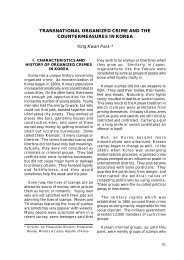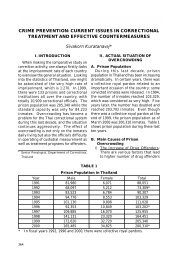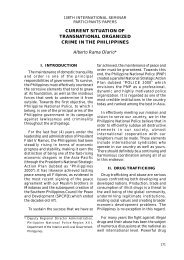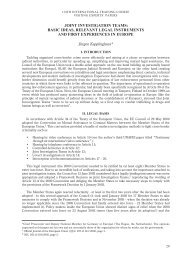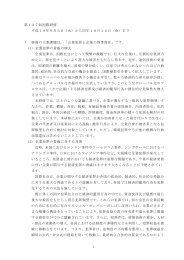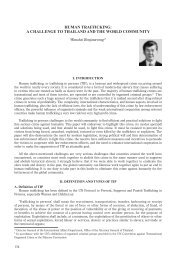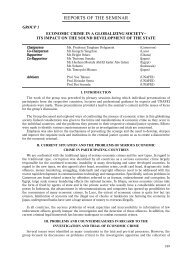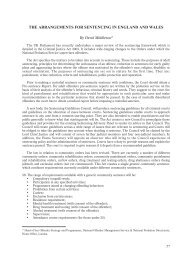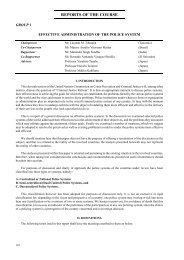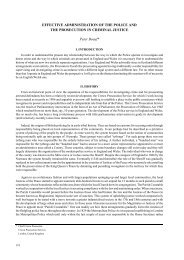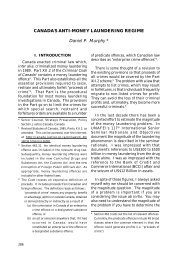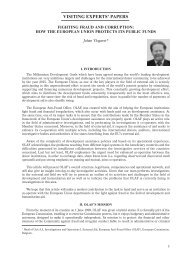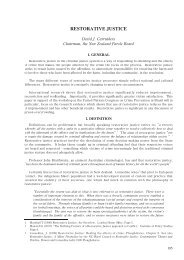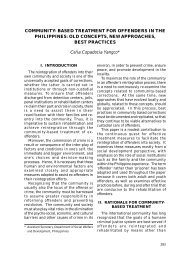ethics, deontology, discipline of judges and prosecutors in france
ethics, deontology, discipline of judges and prosecutors in france
ethics, deontology, discipline of judges and prosecutors in france
Create successful ePaper yourself
Turn your PDF publications into a flip-book with our unique Google optimized e-Paper software.
143RD INTERNATIONAL TRAINING COURSE<br />
VISITING EXPERTS’ PAPERS<br />
ETHICS, DEONTOLOGY, DISCIPLINE OF JUDGES<br />
AND PROSECUTORS IN FRANCE<br />
Eric J. Maitrepierre*<br />
I. INTRODUCTION: ETHICS, DEONTOLOGY, DISCIPLINE:<br />
THREE DIFFERENT WORDS, THREE CONCEPTS<br />
The questions <strong>of</strong> <strong>ethics</strong>, <strong>deontology</strong> <strong>and</strong> <strong>discipl<strong>in</strong>e</strong> are at the core <strong>of</strong> the contemporary reflection on the<br />
role <strong>of</strong> justice. Justice only exists by the <strong>in</strong>tervention <strong>of</strong> men <strong>and</strong> women who make it. There is not a country<br />
<strong>in</strong> world which does not wonder how to make its judiciary really <strong>in</strong>dependent, how to make its <strong>judges</strong> <strong>and</strong><br />
<strong>prosecutors</strong> more just <strong>and</strong> more impartial <strong>and</strong> how to strengthen their <strong>in</strong>tegrity. It is <strong>of</strong>ten a political <strong>and</strong><br />
very significant question, <strong>and</strong> a question <strong>of</strong> balance <strong>of</strong> power between the executive <strong>and</strong> the judiciary. That is<br />
the case <strong>in</strong> Canada or <strong>in</strong> South Africa, <strong>in</strong> France or <strong>in</strong> Brazil, <strong>in</strong> Italy or <strong>in</strong> Cambodia: the reflection is ongo<strong>in</strong>g<br />
<strong>and</strong> must lead to new rules which meet citizens’ needs <strong>and</strong> democratic requirements. The goal is simple:<br />
<strong>in</strong>creased confidence <strong>in</strong> justice, <strong>in</strong> <strong>prosecutors</strong> <strong>and</strong> <strong>in</strong> <strong>judges</strong>.<br />
Whatever the topic, it is always necessary to start by giv<strong>in</strong>g a direction to the words. We never should<br />
forget the etymology <strong>of</strong> the words.<br />
Ethics comes from the Greek word ta éthé that means manners or habit. The lat<strong>in</strong> word (mores), means<br />
habit, has the same signification. It underl<strong>in</strong>es the idea <strong>of</strong> “ways <strong>of</strong> act<strong>in</strong>g given by the use”.<br />
1. Mores will be translated <strong>in</strong> French as “morale” <strong>and</strong> <strong>in</strong> English as “moral”.<br />
2. Deontology st<strong>and</strong>ards are different from the statutory <strong>and</strong> discipl<strong>in</strong>ary rules.<br />
3. Ethics means an <strong>in</strong>tention to make well, with the aim <strong>of</strong> the common good <strong>in</strong> the exercise <strong>of</strong> a task.<br />
4. Deontology states the explicit pr<strong>in</strong>ciples which guide this <strong>in</strong>tention, <strong>in</strong> facts.<br />
5. Discipl<strong>in</strong>e is the sanction <strong>of</strong> the faults made when act<strong>in</strong>g.<br />
6. Ethics relates to the tra<strong>in</strong><strong>in</strong>g <strong>of</strong> a behaviour.<br />
7. Discipl<strong>in</strong>e sanctions bad act<strong>in</strong>g. Discipl<strong>in</strong>e sanctions immediately or quite immediately a k<strong>in</strong>d <strong>of</strong> “badly<br />
mak<strong>in</strong>g” but Ethics characterizes the idea <strong>of</strong> “to make well”. Ethics is a process.<br />
8. Ethics serves the objectives <strong>of</strong> global improvement.<br />
9. Discipl<strong>in</strong>e is restricted to <strong>in</strong>tervene a posteriori <strong>and</strong> punctually.<br />
All the difficulty is concentrated on the ambiguous position <strong>of</strong> <strong>deontology</strong>, which can have two very<br />
different directions accord<strong>in</strong>g to whether it is associated with <strong>discipl<strong>in</strong>e</strong> or is directed by <strong>ethics</strong>. In the first<br />
case, what is important is the will to make an <strong>in</strong>strument <strong>of</strong> control <strong>of</strong> an a posteriori <strong>in</strong>dividual behaviour.<br />
It is the penal model <strong>of</strong> the <strong>in</strong>fr<strong>in</strong>gement <strong>and</strong> the penalty which plays aga<strong>in</strong>, if I may say, on the discipl<strong>in</strong>ary<br />
field.<br />
But, close to <strong>ethics</strong>, <strong>deontology</strong> st<strong>and</strong>ards become a source <strong>of</strong> help for a decision-maker exposed to the<br />
risks. Together, <strong>ethics</strong> <strong>and</strong> <strong>deontology</strong> create a model <strong>of</strong> desirable behaviour. Deontology is not restricted<br />
* Director <strong>of</strong> the International <strong>and</strong> European Department, M<strong>in</strong>istry <strong>of</strong> Justice, Paris, France.<br />
255
256<br />
RESOURCE MATERIAL SERIES No.80<br />
anymore to underl<strong>in</strong>e behaviour <strong>in</strong> a polarity fault/sanction, but becomes a reference to values. Try<strong>in</strong>g to<br />
solve this question supposes as a precondition a democratic will: to recognize an effective <strong>in</strong>dependence<br />
<strong>of</strong> Justice that authorizes to assign duties to it. An assumed responsibility makes <strong>in</strong>dependence credible.<br />
Without this preoccupation <strong>of</strong> a balance, <strong>deontology</strong> becomes a pure <strong>in</strong>strument <strong>of</strong> control.<br />
Nowadays, be a judge is to be visible. No state can hide the courts. The function <strong>of</strong> judg<strong>in</strong>g open is to<br />
civil society which expresses the need for justice but which wants, the other h<strong>and</strong>, to have a right to see <strong>and</strong><br />
to criticize. Formerly founded on silence <strong>and</strong> discretion, confidence <strong>in</strong> justice f<strong>in</strong>ds today its justification <strong>in</strong><br />
the transparency <strong>of</strong> the revealed faults <strong>and</strong> the reality <strong>of</strong> the sanctions which are <strong>in</strong>flicted on <strong>prosecutors</strong> or<br />
<strong>judges</strong> who do not act properly.<br />
One cannot be satisfied with an exclusively discipl<strong>in</strong>ary responsibility a posteriori where the power <strong>of</strong><br />
the judge does not cease grow<strong>in</strong>g. The ethical approach implies a widened responsibility. Beside a more<br />
transparent system <strong>of</strong> sanctions, <strong>ethics</strong> has its own dimension which concerns the st<strong>and</strong>ards <strong>in</strong> a situation.<br />
The <strong>in</strong>dividual virtues (fidelity, prudence, honour) are found to apply either only to one <strong>in</strong>dividual action or<br />
to the service <strong>of</strong> an <strong>in</strong>stitution.<br />
Deontology is the science <strong>of</strong> pr<strong>of</strong>essional duties. Is this moral or is this right? That is the question. The<br />
word <strong>and</strong> the concept were <strong>in</strong>vented by Jeremy Bentham (1748-1832), an English philosopher, represent<strong>in</strong>g the<br />
“utilitarian” current <strong>in</strong> philosophy. The essence <strong>of</strong> his concept is <strong>in</strong> a posthumous book, “Deontology or The<br />
Science <strong>of</strong> Morality”.<br />
The basic idea <strong>of</strong> Bentham is “to emphasize the ratios which l<strong>in</strong>k the <strong>in</strong>terest with the duty <strong>in</strong> all the<br />
events <strong>of</strong> the life”. Accord<strong>in</strong>g to him, “the duty <strong>of</strong> a man could never consist <strong>in</strong> do<strong>in</strong>g what it is <strong>of</strong> his <strong>in</strong>terest<br />
not to make”. Thus, “the task <strong>of</strong> a modern moralist is to show that an immoral act is a false calculation <strong>of</strong> the<br />
personal <strong>in</strong>terest <strong>and</strong> that the vicious man makes an erroneous estimate <strong>of</strong> the pleasures <strong>and</strong> sorrows”. It<br />
was Bentham who forged the neologism “Deontology”.<br />
The word “<strong>deontology</strong>” is derived from two Greek words, “deon” (what is suitable) <strong>and</strong> “logos”<br />
(knowledge), i.e. knowledge <strong>of</strong> what is right <strong>and</strong> suitable. Its conclusion is that “the base <strong>of</strong> the <strong>deontology</strong> is<br />
the pr<strong>in</strong>ciple <strong>of</strong> utility. In another word, an action is good or bad, worthy or makes <strong>in</strong>dignant, deserves approval<br />
or blame, <strong>in</strong> proportion to its tendency to <strong>in</strong>crease or decrease the sum <strong>of</strong> public satisfaction”.<br />
Bentham thus estimates that <strong>deontology</strong> is a utility moral which is used to limit the need for legal<br />
regulation. But the question still rema<strong>in</strong>s on the core nature <strong>of</strong> <strong>deontology</strong>. For some people, it is a moral<br />
which is moulted <strong>in</strong> law. For others, it is a moral sanctioned by the law.<br />
II. AN HISTORICAL APPROACH TO PROFESSIONAL DEONTOLOGY IN FRANCE<br />
Deontology <strong>in</strong> France “met the law” when the first Code <strong>of</strong> Ethics, for medical practitioners, was created<br />
by a regulation <strong>of</strong> 27 June 1947. What is the value <strong>of</strong> this code <strong>and</strong> those which came later on? It cannot be<br />
doubted that it is, formally, adm<strong>in</strong>istrative regulations: a great majority <strong>of</strong> theses “codes” are decrees <strong>of</strong> the<br />
executive branch <strong>of</strong> the government. But here the State, while legislat<strong>in</strong>g, does noth<strong>in</strong>g but sanction: it is<br />
not the State which works out. The codes are generally discussed with<strong>in</strong> responsibility <strong>and</strong> leadership <strong>of</strong> the<br />
pr<strong>of</strong>essional orders (<strong>in</strong> particular for health pr<strong>of</strong>essionals). Generally these pr<strong>of</strong>essional orders then propose<br />
that the government gives them consistency by lawful meaus. Moreover, for lawyers, there is a paradox: for<br />
them <strong>deontology</strong> rema<strong>in</strong>s essentially abstract: there is not a s<strong>in</strong>gle word written that could be considered the<br />
beg<strong>in</strong>n<strong>in</strong>g <strong>of</strong> a code <strong>of</strong> conduct.<br />
Let us be clear: <strong>deontology</strong> concerns thus the capacity <strong>of</strong> reflection <strong>of</strong> the pr<strong>of</strong>essional bodies to which it<br />
is addressed. The codes which enact it are endorsed by the government. It is thus with this distribution <strong>of</strong><br />
tasks that the government supervises <strong>and</strong> imposes pr<strong>of</strong>essional <strong>deontology</strong>.<br />
Therefore, we have to return to the def<strong>in</strong>ition <strong>of</strong> the word: it happens quite <strong>of</strong>ten today that <strong>deontology</strong><br />
not only <strong>in</strong>cludes what belongs to it naturally but also all the “pr<strong>of</strong>essional duties”, moral <strong>and</strong> legal. Briefly,<br />
<strong>deontology</strong> tends to be understood as additional rules that the pr<strong>of</strong>essional must respect, whether these rules
143RD INTERNATIONAL TRAINING COURSE<br />
VISITING EXPERTS’ PAPERS<br />
have a moral orig<strong>in</strong> or are the result <strong>of</strong> a technical regulation. This is why it is more suitable to speak about<br />
“rights <strong>and</strong> <strong>deontology</strong>” <strong>of</strong> such pr<strong>of</strong>essions rather than simply <strong>deontology</strong>.<br />
In addition it should not be denied that contemporary <strong>deontology</strong> tends to move away from its normal<br />
source to become legal, i.e. dependent on a process <strong>of</strong> control <strong>and</strong> sanctions. The result is, step by<br />
step, a pr<strong>of</strong>essional regulation where the government, by simplification, through its concern to arrive<br />
at a consensus, by safety, <strong>and</strong> even by a form <strong>of</strong> demagogy, entrusts the development <strong>of</strong> <strong>deontology</strong> to<br />
pr<strong>of</strong>essional organizations (authorities <strong>of</strong> the type <strong>of</strong> “the Higher Council”, pr<strong>of</strong>essional orders, trade unions,<br />
etc.).<br />
At the end <strong>of</strong> the process, <strong>deontology</strong>, as it is conceived <strong>in</strong> France, is a strange mixture <strong>of</strong> “s<strong>of</strong>t law” <strong>and</strong><br />
“hard morals”. In the worst <strong>of</strong> the cases, it can even be the mechanical voice <strong>of</strong> a conscientiousness hav<strong>in</strong>g<br />
lost any reference po<strong>in</strong>t to the real problems <strong>of</strong> the people to which it applies. Deontology should not s<strong>in</strong>k <strong>in</strong><br />
such confusion.<br />
Deontology can also exist outside <strong>of</strong> legal frameworks. In fact, it should be underl<strong>in</strong>ed that this slow<br />
conquest <strong>of</strong> <strong>deontology</strong> by the law is due to an <strong>in</strong>escapable contemporary phenomenon. In a society which is<br />
affirmed as secular, the only po<strong>in</strong>t <strong>of</strong> convergence ends up be<strong>in</strong>g the law.<br />
The rule <strong>of</strong> law, it is a State/government which, little by little, conquers all capacities. It is the government<br />
be<strong>in</strong>g <strong>in</strong>troduced <strong>in</strong>to all the aspects <strong>of</strong> life s<strong>in</strong>ce it replaces Providence, chance, the conscience. As<br />
opposed to what many legal authors write, the rule <strong>of</strong> law is not the deterioration <strong>of</strong> the Legal State but its<br />
absolute triumph. All becomes law, all is moulted <strong>in</strong> law. A law which, to be accepted, can take on multiple<br />
alternatives (law <strong>of</strong> the State, law <strong>of</strong> the European Union, law <strong>of</strong> the pr<strong>of</strong>essions, etc.), which can even<br />
accept a certa<strong>in</strong> control (Constitution, <strong>in</strong>ternational treaties, etc.). But f<strong>in</strong>ally, that is law nevertheless: it is<br />
the drift <strong>of</strong> a civil society which tends to reduce the role <strong>of</strong> morals by transform<strong>in</strong>g it <strong>in</strong>to rights.<br />
However, it is certa<strong>in</strong> that if any discipl<strong>in</strong>ary fault is a <strong>deontology</strong> fault, any failure with <strong>deontology</strong> does<br />
not <strong>in</strong>volve a discipl<strong>in</strong>ary action or an action <strong>of</strong> civil liability. The aggravated behaviour <strong>of</strong> a judge dur<strong>in</strong>g the<br />
hear<strong>in</strong>gs; behaviour not confraternal <strong>of</strong> a lawyer; the lack <strong>of</strong> eagerness <strong>of</strong> a bailiff to execute an order <strong>of</strong> the<br />
court, certa<strong>in</strong>ly constitute <strong>deontology</strong> failures for which it is advisable to formulate adapted remedies. But<br />
these remedies will be different from those which the <strong>discipl<strong>in</strong>e</strong> or the civil liability applies. Comparative<br />
studies show that the various legal systems do not consider <strong>deontology</strong> <strong>and</strong> <strong>ethics</strong> <strong>in</strong> the same way.<br />
III. REFLECTION ON ETHICS AND DEONTOLOGY OF JUDGES<br />
AND PROSECUTORS IN FRANCE<br />
In France, the debate on <strong>deontology</strong> <strong>and</strong> responsibility <strong>of</strong> <strong>judges</strong> was renewed at the beg<strong>in</strong>n<strong>in</strong>g <strong>of</strong> this<br />
century, <strong>in</strong> particular by the <strong>in</strong>stallation <strong>of</strong> a Commission on reflection on <strong>ethics</strong> <strong>in</strong> the magistracy, under the<br />
chairmanship <strong>of</strong> a member <strong>of</strong> the Constitutional Council <strong>in</strong> June 2003. Several reasons justified this revival.<br />
It was <strong>in</strong>itially a question <strong>of</strong> answer<strong>in</strong>g specific difficulties <strong>in</strong>herent <strong>in</strong> the democracy <strong>of</strong> op<strong>in</strong>ion which is<br />
ours. Justice is made under the great expectation <strong>and</strong> requirements <strong>of</strong> citizens, the citizens <strong>of</strong> the rule <strong>of</strong> law,<br />
<strong>and</strong> especially, <strong>of</strong> the media. The media are capable <strong>of</strong> deeply emphasiz<strong>in</strong>g miscarriages <strong>of</strong> justice. It is likely<br />
to throw discredit upon the judicial <strong>in</strong>stitution <strong>and</strong> to make citizens’ lose the legitimate confidence that they<br />
should have <strong>in</strong> the judicial system. The answer <strong>of</strong> the <strong>judges</strong> <strong>and</strong> <strong>prosecutors</strong> thus passes by a reflection<br />
publicly shown <strong>and</strong> constructive on their own <strong>deontology</strong>.<br />
It was then a question <strong>of</strong> re<strong>in</strong>forc<strong>in</strong>g the public image <strong>of</strong> equitable lawsuits, for civil cases as for crim<strong>in</strong>al<br />
cases. One cannot be unaware <strong>of</strong> the requirements that the European Court <strong>of</strong> Human Rights (<strong>in</strong> the city<br />
<strong>of</strong> Strasbourg, <strong>in</strong> the east <strong>of</strong> France) made weigh on <strong>judges</strong> when it ruled on the requests formed aga<strong>in</strong>st<br />
the French State. I recall that the European Court is competent to rule on the litigations relat<strong>in</strong>g to the<br />
application <strong>of</strong> the European Convention on Human Rights. This convention, <strong>in</strong> its Article 6, provides <strong>in</strong><br />
particular that any person is entitled to an equitable lawsuit, with<strong>in</strong> a reasonable time <strong>and</strong> <strong>in</strong> front <strong>of</strong> an<br />
impartial judge. A citizen <strong>of</strong> a country hav<strong>in</strong>g ratified the Convention can, after hav<strong>in</strong>g exhausted the<br />
possibilities for appeal <strong>in</strong> his or her country, sue before the Court his or her own government. It is the State<br />
257
crim<strong>in</strong>al <strong>in</strong>vestigation. It underl<strong>in</strong>ed:<br />
143RD INTERNATIONAL TRAINING COURSE<br />
VISITING EXPERTS’ PAPERS<br />
• the non-observance <strong>of</strong> the presumption <strong>of</strong> <strong>in</strong>nocence;<br />
• the abuse <strong>of</strong> committal <strong>and</strong> preventive custody;<br />
• the bad quality <strong>of</strong> the psychological experts <strong>and</strong> psychiatrists;<br />
• the <strong>in</strong>experience <strong>and</strong> the lonel<strong>in</strong>ess <strong>of</strong> the exam<strong>in</strong><strong>in</strong>g judge;<br />
• the absence <strong>of</strong> underst<strong>and</strong><strong>in</strong>g <strong>of</strong> the prosecutor;<br />
• the <strong>in</strong>efficiency <strong>of</strong> the appeal procedure dur<strong>in</strong>g the <strong>in</strong>vestigation.<br />
The role <strong>of</strong> the media, which charged the defendants at the beg<strong>in</strong>n<strong>in</strong>g <strong>of</strong> the case <strong>and</strong> supported them at<br />
the end, was also criticized.<br />
The report <strong>of</strong> the committee led to an important reform <strong>of</strong> the crim<strong>in</strong>al procedure <strong>in</strong> March 2007. The<br />
rights <strong>of</strong> the defendant were <strong>in</strong>creased; the crim<strong>in</strong>al procedure re<strong>in</strong>forced protection <strong>and</strong> control <strong>of</strong> the<br />
second degree <strong>of</strong> jurisdiction <strong>and</strong> created an obligation <strong>of</strong> video tape record<strong>in</strong>gs <strong>of</strong> hear<strong>in</strong>gs by police.<br />
Especially for the question <strong>of</strong> <strong>deontology</strong> <strong>and</strong> <strong>discipl<strong>in</strong>e</strong>, which concerns us, the Outreau case created<br />
the bases <strong>of</strong> a new approach which takes account at the same time <strong>of</strong> the need for a better tra<strong>in</strong><strong>in</strong>g <strong>of</strong><br />
<strong>judges</strong> <strong>and</strong> <strong>prosecutors</strong>. High representatives <strong>of</strong> the parliament <strong>and</strong> <strong>of</strong> the judiciary suggestted work<strong>in</strong>g<br />
on <strong>deontology</strong> <strong>in</strong> terms <strong>of</strong> “cod<strong>in</strong>g”, <strong>and</strong> for the first time suggested the possibility <strong>of</strong> citizens directly<br />
denounc<strong>in</strong>g miscarriages at the High Council <strong>of</strong> the Judiciary (CSM).<br />
This reflection is jo<strong>in</strong>ed not only with a reform <strong>of</strong> the crim<strong>in</strong>al procedure but also by the law <strong>of</strong> 5 March<br />
2007, with a new approach to the <strong>deontology</strong>, seen under the angle, on one h<strong>and</strong>, <strong>of</strong> the development <strong>of</strong> a<br />
“collection” <strong>of</strong> <strong>deontology</strong> obligations for <strong>judges</strong> <strong>and</strong> <strong>prosecutors</strong>, <strong>and</strong> on another h<strong>and</strong>, under the angle <strong>of</strong><br />
their recruitment <strong>and</strong> <strong>in</strong>itial tra<strong>in</strong><strong>in</strong>g.<br />
IV. A NEW APPROACH TO DEONTOLOGY: TOWARDS A CODE?<br />
Article 64 <strong>of</strong> the constitution <strong>of</strong> 4 October 1958 states: “The President <strong>of</strong> the Republic guarantees the<br />
<strong>in</strong>dependence <strong>of</strong> the Judicial Authority. He is assisted by the High Council <strong>of</strong> Judiciary (CSM). A Law is<br />
drafted for the status <strong>of</strong> <strong>judges</strong> <strong>and</strong> <strong>prosecutors</strong>. The <strong>judges</strong> are irremovable. ”<br />
The Parliament, at the time <strong>of</strong> the vote on the law <strong>of</strong> 5 March 2007, related to the recruitment, tra<strong>in</strong><strong>in</strong>g<br />
<strong>and</strong> the responsibility <strong>of</strong> <strong>judges</strong> <strong>and</strong> <strong>prosecutors</strong>, quite naturally decided, tak<strong>in</strong>g <strong>in</strong>to account the essential<br />
role <strong>of</strong> the CSM <strong>in</strong> the <strong>in</strong>stitutional framework <strong>of</strong> the Judiciary, that “the High Council <strong>of</strong> Judiciary shall<br />
devise <strong>and</strong> publish a collection <strong>of</strong> <strong>deontology</strong> obligations for <strong>judges</strong> <strong>and</strong> <strong>prosecutors</strong>” (Article 18).<br />
This order <strong>of</strong> the Parliament has a precise objective. But it gives the CSM any latitude to reach that<br />
po<strong>in</strong>t. No particular requirement, no policy, no calendar are fixed.<br />
From April 2007, the CSM set up a work<strong>in</strong>g group with a double challenge: reflection <strong>and</strong> draft<strong>in</strong>g.<br />
With this <strong>in</strong>tention, the CSM <strong>in</strong>itially took rather traditional steps <strong>of</strong> research <strong>of</strong> precedents <strong>and</strong> comparative<br />
data, <strong>in</strong> particular <strong>of</strong> foreign countries. The CSM then engaged <strong>in</strong> a step more <strong>in</strong>novat<strong>in</strong>g. It started from the idea<br />
that the wish <strong>of</strong> the Parliament to write such a collection reveals a situation <strong>in</strong> which exists, before all k<strong>in</strong>ds <strong>of</strong><br />
other considerations, a crisis <strong>of</strong> public confidence <strong>in</strong> the justice system.<br />
The CSM wanted to know the state <strong>of</strong> m<strong>in</strong>d <strong>of</strong> <strong>judges</strong> <strong>and</strong> <strong>prosecutors</strong> but also that <strong>of</strong> the op<strong>in</strong>ion. It thus<br />
ordered two surveys at a poll<strong>in</strong>g organization.<br />
These surveys have not yet been completely analysed by the CSM. They will be however extremely<br />
useful to know which operational conclusions precisely to draw. But right now one can say that France, like<br />
other countries, but without admitt<strong>in</strong>g it openly, will take the way <strong>of</strong> someth<strong>in</strong>g that looks like a code. The<br />
surveys reveal that <strong>judges</strong> <strong>and</strong> <strong>prosecutors</strong> have a good image <strong>of</strong> the judiciary. They are sceptics however<br />
on the image that French citizens have: they consider that French people are critical <strong>of</strong> their justice system.<br />
It is <strong>in</strong>terest<strong>in</strong>g to stress that this perception is <strong>in</strong> shift compared to what the general public th<strong>in</strong>ks <strong>of</strong> the<br />
259
260<br />
RESOURCE MATERIAL SERIES No.80<br />
magistrates, s<strong>in</strong>ce 63% <strong>of</strong> French citizens rely on their justice system.<br />
The French people place honesty, <strong>in</strong>tegrity, impartiality <strong>and</strong> legality <strong>of</strong> the core <strong>of</strong> the deontological<br />
values which they require for <strong>judges</strong> <strong>and</strong> <strong>prosecutors</strong>. Up to 94% consider that the creation <strong>of</strong> a collection <strong>of</strong><br />
rules will improve the daily function<strong>in</strong>g <strong>of</strong> justice. Among those who know <strong>of</strong> the existence <strong>of</strong> the CSM, 84%<br />
estimate to trust it to work out the collection <strong>of</strong> <strong>deontology</strong> obligations.<br />
It is thus too early to know what will come out from this work but there is an obvious conclusion.<br />
The idea has advanced, <strong>in</strong> France, for 10 years, towards what is not called yet a code but which looks like<br />
a code. It will probably not be a whole book <strong>of</strong> prohibitions or regulations. It will not be a k<strong>in</strong>d <strong>of</strong> “ten<br />
comm<strong>and</strong>ments” nor a collection <strong>of</strong> recipes (even if France is the country <strong>of</strong> good cook<strong>in</strong>g!). It will not be<br />
a text with a discipl<strong>in</strong>ary vocation. It will be rather a compromise between all <strong>of</strong> these th<strong>in</strong>gs, a mixture <strong>of</strong><br />
<strong>deontology</strong> rules result<strong>in</strong>g from <strong>in</strong>ternational texts <strong>and</strong> <strong>of</strong> conclusions - by broad topics - that exist, issued<br />
from the discipl<strong>in</strong>ary decisions published s<strong>in</strong>ce 1958.<br />
V. DISCIPLINE<br />
Before speak<strong>in</strong>g about the discipl<strong>in</strong>ary questions <strong>in</strong> France, it is important to precisely set out the<br />
number <strong>of</strong> <strong>judges</strong> <strong>and</strong> <strong>prosecutors</strong> <strong>in</strong> France, a country <strong>of</strong> sixty two million <strong>in</strong>habitants.<br />
As <strong>of</strong> 31 December 2008, the total staff <strong>of</strong> pr<strong>of</strong>essional <strong>judges</strong> <strong>and</strong> <strong>prosecutors</strong> <strong>in</strong> courts, <strong>in</strong>clud<strong>in</strong>g the<br />
Supreme Court, was 7,817 (5,886 <strong>judges</strong>, that is to say 75.30%; 1,931 <strong>prosecutors</strong>, i.e. 24.70%), which<br />
represents 112 <strong>judges</strong> <strong>and</strong> <strong>prosecutors</strong> (+1.45%) more than at 31 December 2007.<br />
The number <strong>of</strong> <strong>judges</strong> <strong>and</strong> <strong>prosecutors</strong> work<strong>in</strong>g out <strong>of</strong> jurisdictions (i.e <strong>in</strong> the M<strong>in</strong>istry <strong>of</strong> Justice,<br />
Inspection <strong>of</strong> the Judicial Services, magistrates detached <strong>in</strong> other m<strong>in</strong>istries, <strong>in</strong>clud<strong>in</strong>g at the National<br />
Judicial Academy, magistrates <strong>in</strong> positions work<strong>in</strong>g abroad <strong>in</strong> <strong>in</strong>ternational <strong>in</strong>stitutions) rose on this date to<br />
491.<br />
The real number <strong>of</strong> active <strong>judges</strong> <strong>and</strong> <strong>prosecutors</strong> was thus: 8,308 (868 <strong>in</strong> the high-rank hierarchy (HH),<br />
i.e 10.45% <strong>of</strong> the body; 4,512 <strong>of</strong> the first rank, i.e 54.31% <strong>of</strong> the body; <strong>and</strong> 2,928 <strong>of</strong> the second rank, i.e<br />
35.24% <strong>of</strong> the judicial body).<br />
It is necessary to add to that approximately 20,000 magistrates are not pr<strong>of</strong>essionals but work <strong>in</strong> a<br />
temporary capacity <strong>in</strong> specialized courts like the commercial courts, the juvenile courts or the courts<br />
regulat<strong>in</strong>g litigations ris<strong>in</strong>g from contracts <strong>of</strong> employment.<br />
The body <strong>of</strong> pr<strong>of</strong>essional <strong>judges</strong> <strong>and</strong> <strong>prosecutors</strong> is thus relatively not very important. Compared with<br />
other European countries, France has a lower number <strong>of</strong> <strong>judges</strong> per 100,000 <strong>in</strong>habitants.<br />
France: 11. 9/100,000<br />
Germany: 24. 5/100,000<br />
Italy: 11/100,000<br />
The Netherl<strong>and</strong>s: 12. 7/100,000<br />
The United K<strong>in</strong>gdom: 7/100,000<br />
Spa<strong>in</strong>: 10. 1/100,000<br />
For the <strong>prosecutors</strong>, France is def<strong>in</strong>itely lower than the average.<br />
France: 2. 9/100,000<br />
Germany: 6. 2/100,000<br />
Italy: 3. 8/100,000<br />
The Netherl<strong>and</strong>s: 4. 1/100,000<br />
The United K<strong>in</strong>gdom: 4. 6/100,000<br />
Spa<strong>in</strong>: 4. 5/100,000
From all that, we can say:<br />
143RD INTERNATIONAL TRAINING COURSE<br />
VISITING EXPERTS’ PAPERS<br />
• That <strong>prosecutors</strong> <strong>and</strong> <strong>judges</strong> are pr<strong>of</strong>essionals;<br />
• That the judicial body is not very important compared to the population;<br />
• That France falls with<strong>in</strong> a European average.<br />
Let us add to that historical <strong>and</strong> sociological <strong>in</strong>formation. France is a country <strong>of</strong> Law <strong>and</strong> <strong>of</strong> rights but it<br />
is not a country <strong>of</strong> <strong>judges</strong>. By say<strong>in</strong>g that, I want to emphasize that justice is not a powerful political body<br />
<strong>and</strong> that the balance <strong>of</strong> power is not <strong>in</strong> France what it is <strong>in</strong> the United States, for example. In addition, <strong>judges</strong><br />
<strong>and</strong> <strong>prosecutors</strong> do not come from the bar. They are recruited via competition after hav<strong>in</strong>g obta<strong>in</strong>ed a law<br />
degree. They have a career, from approximately 25 years old, until (on average) 63 years with a hierarchical<br />
progression.<br />
The question <strong>of</strong> <strong>discipl<strong>in</strong>e</strong> was tackled over a long period <strong>of</strong> time, with discretion. The magistracy did not<br />
wish that is evoked on the public op<strong>in</strong>ion the faults made by <strong>judges</strong> <strong>and</strong> <strong>prosecutors</strong>, both <strong>in</strong> the service <strong>and</strong><br />
outside the service.<br />
Therefore, s<strong>in</strong>ce 1996, before the legislator agreed with this practice by the law <strong>of</strong> 25 June 2001, the<br />
CSM had decided that with regard to discipl<strong>in</strong>ary matters that the hear<strong>in</strong>gs <strong>of</strong> the CSM would be public, to<br />
conform to the pr<strong>in</strong>ciples <strong>of</strong> the equitable lawsuit <strong>and</strong> the spirit <strong>of</strong> the decisions <strong>of</strong> the European Court <strong>of</strong><br />
Human Rights, already evoked.<br />
In addition, the first edition <strong>of</strong> a collection <strong>of</strong> the discipl<strong>in</strong>ary decisions <strong>of</strong> the CSM was published <strong>in</strong> the<br />
first half <strong>of</strong> 2006. The Council had decided the draft<strong>in</strong>g <strong>of</strong> this work, by a will <strong>of</strong> transparency, to fight the<br />
criticism <strong>of</strong> corporatism <strong>of</strong>ten conveyed aga<strong>in</strong>st the magistracy <strong>and</strong>, f<strong>in</strong>ally, to <strong>in</strong>form the <strong>judges</strong> <strong>and</strong> the<br />
<strong>prosecutors</strong> <strong>of</strong> the jurisprudence regard<strong>in</strong>g their duties. As it stated, the Council wanted “to allow the <strong>judges</strong><br />
<strong>and</strong> <strong>prosecutors</strong> to know their pr<strong>of</strong>essional requirements, <strong>and</strong> to allow citizens to know the conditions <strong>of</strong> an<br />
impartial exercise <strong>of</strong> justice”.<br />
By these two series <strong>of</strong> <strong>in</strong>itiatives, the Council had thus shown the importance which it <strong>in</strong>tended to give to<br />
the questions <strong>of</strong> <strong>deontology</strong> <strong>and</strong> <strong>discipl<strong>in</strong>e</strong>.<br />
The publication <strong>of</strong> this work was truly a revelation. It showed that over a priod <strong>of</strong> fifty years, 201<br />
<strong>judges</strong> <strong>and</strong> <strong>prosecutors</strong> were <strong>discipl<strong>in</strong>e</strong>d. It was possible to f<strong>in</strong>d all k<strong>in</strong>ds <strong>of</strong> misconduct: paedophilia, theft,<br />
acceptance <strong>of</strong> gifts, absence <strong>of</strong> any work, delays <strong>in</strong> address<strong>in</strong>g files, <strong>and</strong> excesses <strong>of</strong> all k<strong>in</strong>ds, <strong>in</strong>clud<strong>in</strong>g <strong>in</strong><br />
private life. One f<strong>in</strong>ds magistrates who lodge young del<strong>in</strong>quents <strong>in</strong> their residence <strong>and</strong> drive after consum<strong>in</strong>g<br />
alcoholic beverages. One f<strong>in</strong>ds on the other h<strong>and</strong> very few cases <strong>of</strong> corruption. When there are some, the<br />
corruption relates to small sums <strong>and</strong>, curiously, is matched with small counterparts. All <strong>in</strong> all, the corrupters<br />
<strong>of</strong>fer little for small services.<br />
To those who claim that J&Ps are never sanctioned for their failures, the CSM delivered a strong denial:<br />
a book <strong>of</strong> 863 pages, <strong>in</strong> which their problems dat<strong>in</strong>g from 1958 are <strong>in</strong>dexed (1958 was the foundation year<br />
<strong>of</strong> the CSM). By read<strong>in</strong>g that, pr<strong>of</strong>essionals, citizens <strong>and</strong> media discovered strange cases or astonish<strong>in</strong>g<br />
decisions. Former discipl<strong>in</strong>ary decisions, <strong>in</strong> particular, show that the evaluation <strong>of</strong> faults varies with time <strong>and</strong><br />
with a new level <strong>of</strong> conscience. What was slightly condemned twenty years ago is heavily sanctioned today.<br />
VI. DISCIPLINARY ACTION: CONDITIONS AND PROCEDURES<br />
The <strong>deontology</strong> questions, as I have just expla<strong>in</strong>ed, are <strong>in</strong> full reflection. However, <strong>discipl<strong>in</strong>e</strong> <strong>in</strong> between<br />
was based, for a long time, on precise rules.<br />
As I previously mentioned, Article 64 <strong>of</strong> the Constitution <strong>of</strong> 4 October 1958 states: “The President <strong>of</strong><br />
the Republic guarantees the <strong>in</strong>dependence <strong>of</strong> the Judicial Authority. He is assisted by the High Council<br />
<strong>of</strong> Judiciary (CSM). A Law is drafted for the status <strong>of</strong> <strong>judges</strong> <strong>and</strong> <strong>prosecutors</strong>. This law is Regulation N°<br />
58-1270 dated 22 December 1958.<br />
Even if they are <strong>in</strong>dependent <strong>in</strong> the exercise <strong>of</strong> their functions, <strong>judges</strong> <strong>and</strong> <strong>prosecutors</strong> are obliged to<br />
261
262<br />
RESOURCE MATERIAL SERIES No.80<br />
respect the duties <strong>and</strong> obligations which appear <strong>in</strong> the regulation dated 22 December 1958 (law related to<br />
the statute <strong>of</strong> the magistracy).<br />
Thus, pursuant to Article 6 <strong>of</strong> the statute, any judge or prosecutor, before his or her nom<strong>in</strong>ation to his or<br />
her first position, takes an oath “to well <strong>and</strong> accurately fulfil his or her functions, to ma<strong>in</strong>ta<strong>in</strong> the secrecy <strong>of</strong><br />
the deliberations religiously <strong>and</strong> to act a worthy <strong>and</strong> honest judge (or prosecutor)”.<br />
Article 10, relat<strong>in</strong>g to the duty <strong>of</strong> reserve, forbids <strong>judges</strong> <strong>and</strong> <strong>prosecutors</strong> from “any political<br />
deliberation”; “any demonstration <strong>of</strong> hostility to the pr<strong>in</strong>ciple or the organisation <strong>of</strong> the government <strong>of</strong> the<br />
Republic”; “any demonstration <strong>of</strong> a political nature not compatible with the reserve that their functions<br />
impose on them”; <strong>and</strong> “any jo<strong>in</strong>t action likely to stop or block the function<strong>in</strong>g <strong>of</strong> the courts”.<br />
The statute <strong>of</strong> the magistracy also envisages a series <strong>of</strong> <strong>in</strong>compatibilities, such as prohibition on<br />
practic<strong>in</strong>g any other pr<strong>of</strong>ession, public or private, or on hold<strong>in</strong>g an elective public <strong>of</strong>fice. Moreover, Article<br />
43 <strong>of</strong> the statute <strong>of</strong> the magistracy def<strong>in</strong>es the discipl<strong>in</strong>ary fault as “any failure by a magistrate <strong>in</strong> the duties<br />
<strong>of</strong> his or her situation <strong>and</strong> duties <strong>of</strong> the honour, scrupulousness or dignity”.<br />
The CSM is the discipl<strong>in</strong>ary authority <strong>of</strong> <strong>judges</strong> <strong>and</strong> <strong>prosecutors</strong>. The Council <strong>of</strong> State is a judge <strong>of</strong><br />
cassation <strong>of</strong> the discipl<strong>in</strong>ary decisions pronounced by Council. Indeed, if the <strong>judges</strong> receive a warn<strong>in</strong>g <strong>of</strong> the<br />
chiefs <strong>of</strong> court with<strong>in</strong> the framework <strong>of</strong> the hierarchical discipl<strong>in</strong>ary proceed<strong>in</strong>gs, it is the Council sitt<strong>in</strong>g <strong>in</strong><br />
discipl<strong>in</strong>ary formation which <strong>in</strong>tervenes when the faults justify discipl<strong>in</strong>ary cont<strong>in</strong>uations.<br />
In accordance with Articles 50-1 <strong>and</strong> 50-2 <strong>of</strong> the statute, the discipl<strong>in</strong>ary action with regard to <strong>judges</strong><br />
belongs to the M<strong>in</strong>ister for Justice as well as to the first presidents <strong>of</strong> the Court <strong>of</strong> Appeal, while the<br />
discipl<strong>in</strong>ary power is exerted by the CSM. The discipl<strong>in</strong>ary proceed<strong>in</strong>gs respect the rights <strong>of</strong> defence <strong>and</strong><br />
the pr<strong>in</strong>ciple <strong>of</strong> the contradictory debate. The discipl<strong>in</strong>ary decisions are justified <strong>in</strong> a drafted decision <strong>and</strong><br />
pronounced publicly dur<strong>in</strong>g a hear<strong>in</strong>g.<br />
Article 45 <strong>of</strong> the statute draws up the list <strong>of</strong> the applicable sanctions, from the reprim<strong>and</strong> with <strong>in</strong>scription<br />
<strong>in</strong> the adm<strong>in</strong>istrative file <strong>of</strong> the judge/prosecutor until the dismissal with suspension <strong>of</strong> the rights to the<br />
retirement pension, but does not lay down any rule <strong>of</strong> correspondence between the faults <strong>and</strong> the sanctions.<br />
The discipl<strong>in</strong>ary actions applicable to <strong>judges</strong> <strong>and</strong> <strong>prosecutors</strong> are:<br />
1° reprim<strong>and</strong> with <strong>in</strong>scription <strong>in</strong> the adm<strong>in</strong>istrative file;<br />
2° displacement;<br />
3° withdrawal <strong>of</strong> certa<strong>in</strong> specialized judicial functions;<br />
3° (a) prohibition from appo<strong>in</strong>tment to the functions <strong>of</strong> s<strong>in</strong>gle presid<strong>in</strong>g judge for a maximum <strong>of</strong> five years;<br />
4° lower<strong>in</strong>g <strong>of</strong> hierarchical level;<br />
4° (a) temporary exclusion <strong>of</strong> functions for a maximum duration <strong>of</strong> one year, with total or partial<br />
annulations <strong>of</strong> salary;<br />
5° downgrad<strong>in</strong>g;<br />
6° retirement or admission to cease his or her functions when the judge or the prosecutor is not<br />
entitled to a retirement pension;<br />
7° dismissal with or without suspension <strong>of</strong> the right to get a pension.<br />
It should be also underl<strong>in</strong>ed that apart from any discipl<strong>in</strong>ary action, the General Inspector <strong>of</strong> the Judicial<br />
Services, the first presidents <strong>of</strong> appeal courts, the Attorneys General <strong>and</strong> the directors or heads <strong>of</strong> departments<br />
<strong>of</strong> the M<strong>in</strong>istry <strong>of</strong> Justice have the capacity to give a warn<strong>in</strong>g to the <strong>judges</strong> <strong>and</strong> <strong>prosecutors</strong> placed under their<br />
authority. The warn<strong>in</strong>g is automatically erased from the adm<strong>in</strong>istrative file at the end <strong>of</strong> three years if no new<br />
warn<strong>in</strong>g or no discipl<strong>in</strong>ary action was taken dur<strong>in</strong>g this period.<br />
An <strong>in</strong>novation <strong>of</strong> the Law <strong>of</strong> 2007 was to <strong>in</strong>troduce the discipl<strong>in</strong>ary proceed<strong>in</strong>gs when the State was<br />
condemned for operat<strong>in</strong>g faults. The new Article 48-1 <strong>of</strong> the statute <strong>of</strong> the magistracy states that any f<strong>in</strong>al<br />
decision <strong>of</strong> a national or <strong>in</strong>ternational court condemn<strong>in</strong>g the [French] State for operat<strong>in</strong>g faults <strong>of</strong> the judicial
143RD INTERNATIONAL TRAINING COURSE<br />
VISITING EXPERTS’ PAPERS<br />
service is communicated to the chiefs <strong>of</strong> Court <strong>of</strong> Appeal by the M<strong>in</strong>ister for Justice. The <strong>in</strong>volved judge or<br />
prosecutor is advised under the same conditions. Discipl<strong>in</strong>ary proceed<strong>in</strong>gs can be sued by the M<strong>in</strong>ister <strong>of</strong><br />
Justice or the chiefs <strong>of</strong> Court <strong>of</strong> Appeal under the conditions drafted <strong>in</strong> Articles 50-1, 50-2 <strong>and</strong> 63.<br />
Is it possible for the condemned judge or prosecutor to make an appeal? No right <strong>of</strong> appeal is expressly<br />
envisaged by the statute <strong>of</strong> the magistracy. However, for a long time, the Council <strong>of</strong> State recognizes its<br />
competence as a jurisdiction <strong>of</strong> cassation because the Council <strong>of</strong> State considers that the decision <strong>of</strong> the<br />
CSM comes from an adm<strong>in</strong>istrative authority.<br />
Obviously, there is no particular procedure as regards corruption. Corruption is not aimed at by the texts<br />
like a specific fault open<strong>in</strong>g to a specific procedure. There is no discipl<strong>in</strong>ary list <strong>of</strong> the faults where the theft<br />
would be found, as well as corruption or the absence <strong>of</strong> work. A perfect formula is drafted <strong>in</strong> Article 43 <strong>of</strong><br />
the statute: the fault will be “any failure by a judge or a prosecutor with the duties <strong>of</strong> his (her) condition, the<br />
honour, delicacy or dignity”. That is the framework. But, by its jurisprudence, the CSM says the shapes <strong>and</strong><br />
the limits <strong>of</strong> the discipl<strong>in</strong>ary faults.<br />
VII. INITIAL TRAINING OF JUDGES AND PROSECUTORS ON QUESTIONS<br />
OF ETHICS AND DISCIPLINE<br />
France has a unique academy <strong>of</strong> tra<strong>in</strong><strong>in</strong>g for <strong>judges</strong> <strong>and</strong> <strong>prosecutors</strong> called the National Judicial Academy<br />
(ENM). One enters this academy by a competition.<br />
• First contest: it is necessary to have a Baccalaureate plus four years’ study at a law faculty for the<br />
c<strong>and</strong>idates at the maximum <strong>of</strong> 31 years old. It is thus a competition opened to students;<br />
• Second contest: it is necessary to have four years <strong>of</strong> public service for the c<strong>and</strong>idates less than 46<br />
years old. It is thus a competition open to civil servants;<br />
• Third contest: it is necessary to have eight years experience <strong>in</strong> a private firm for c<strong>and</strong>idates less<br />
than 40 years old. It is thus a competition, to summarize, open to lawyers.<br />
From now, the recruitment, the <strong>in</strong>itial tra<strong>in</strong><strong>in</strong>g <strong>and</strong> the ongo<strong>in</strong>g tra<strong>in</strong><strong>in</strong>g <strong>of</strong> <strong>judges</strong> <strong>and</strong> <strong>prosecutors</strong> are<br />
more structured around competences <strong>and</strong> capacities awaited from them today <strong>and</strong> <strong>in</strong> a foreseeable future.<br />
These fundamental competences <strong>of</strong> <strong>judges</strong> <strong>and</strong> <strong>prosecutors</strong> constitute the deep mark <strong>of</strong> the recent evolution<br />
<strong>of</strong> the Academy <strong>in</strong> its various components. Four major pr<strong>in</strong>ciples guide the activity <strong>of</strong> the Academy:<br />
• The competition must help ascerta<strong>in</strong> the capacity <strong>of</strong> tra<strong>in</strong>ees to acquire these fundamental<br />
competences;<br />
• The <strong>in</strong>itial tra<strong>in</strong><strong>in</strong>g must allow the acquisition <strong>of</strong> these competences;<br />
• The evaluation dur<strong>in</strong>g 31 months’ tra<strong>in</strong><strong>in</strong>g, the exam<strong>in</strong>ation <strong>of</strong> capability <strong>and</strong> the classification, at the<br />
end <strong>of</strong> the tra<strong>in</strong><strong>in</strong>g, must allow the check<strong>in</strong>g <strong>of</strong> the acquisition <strong>of</strong> knowledge <strong>and</strong> <strong>of</strong> know how;<br />
• The ongo<strong>in</strong>g tra<strong>in</strong><strong>in</strong>g must, <strong>in</strong> particular, allow the updat<strong>in</strong>g <strong>of</strong> these competences.<br />
The ENM is a pr<strong>of</strong>essional academy. After courses <strong>of</strong> higher tra<strong>in</strong><strong>in</strong>g for the acquisition <strong>of</strong> an <strong>in</strong>itial<br />
pr<strong>of</strong>essional experiment, it has the role <strong>of</strong> prepar<strong>in</strong>g tra<strong>in</strong>ees for the duty <strong>of</strong> judge <strong>and</strong> prosecutor <strong>in</strong> the<br />
judiciary. The objective <strong>of</strong> tra<strong>in</strong><strong>in</strong>g developed <strong>in</strong> the ENM <strong>in</strong> its dimension <strong>of</strong> <strong>in</strong>itial tra<strong>in</strong><strong>in</strong>g is def<strong>in</strong>ed as<br />
follows: “To tra<strong>in</strong> future <strong>judges</strong> <strong>and</strong> <strong>prosecutors</strong> <strong>in</strong> the various functions by the acquisition <strong>of</strong> fundamental<br />
skills allow<strong>in</strong>g a decision-mak<strong>in</strong>g conforms to the law <strong>and</strong> adapted to its context, respectful <strong>of</strong> the <strong>in</strong>dividual<br />
<strong>and</strong> the ethical <strong>and</strong> <strong>deontology</strong> rules, framed under its national <strong>and</strong> <strong>in</strong>ternational <strong>in</strong>stitutional environment”.<br />
The <strong>in</strong>itial tra<strong>in</strong><strong>in</strong>g lasts 31 months. It alternates courses <strong>and</strong> tra<strong>in</strong><strong>in</strong>g courses, stages <strong>in</strong> courts, <strong>in</strong> the<br />
penitentiary premises <strong>and</strong> <strong>in</strong> law firms, but also <strong>in</strong> private companies or <strong>in</strong>ternational <strong>in</strong>stitutions such as the<br />
European commission.<br />
It is thus not an academic teach<strong>in</strong>g. The judicial academy does not re-teach what is supposed to be<br />
already learned at the Law faculty. The existence <strong>of</strong> a competition <strong>in</strong>clud<strong>in</strong>g written tests <strong>and</strong> oral tests<br />
guarantees the knowledge by the tra<strong>in</strong>ees <strong>of</strong> a necessary legal background. It is a specific vocational tra<strong>in</strong><strong>in</strong>g<br />
which will be focused on the control <strong>of</strong> fundamental capacities.<br />
263
143RD INTERNATIONAL TRAINING COURSE<br />
VISITING EXPERTS’ PAPERS<br />
by citizens under the conditions fixed by a law. This law is currently under discussion before the French<br />
Parliament.<br />
The Parliament is animated by a triple concern:<br />
• To facilitate the exercise by the citizen <strong>of</strong> the right which is guaranteed to him or her by the<br />
Constitution to compla<strong>in</strong>t before the CSM, so that the CSM can sanction the discipl<strong>in</strong>ary faults<br />
made by <strong>judges</strong> <strong>and</strong> <strong>prosecutors</strong>;<br />
• To re<strong>in</strong>force the <strong>in</strong>dependence <strong>of</strong> justice, <strong>in</strong> the spirit <strong>of</strong> the constitutional revision <strong>of</strong> 23 July 2008;<br />
• To guarantee the impartiality <strong>of</strong> the CSM.<br />
On the first po<strong>in</strong>t, the Parliament <strong>in</strong>tends to support the creation <strong>of</strong> a commission <strong>of</strong> the requests <strong>in</strong><br />
charge <strong>of</strong> the filter<strong>in</strong>g <strong>of</strong> the compla<strong>in</strong>ts aga<strong>in</strong>st <strong>judges</strong> or <strong>prosecutors</strong>. It would <strong>in</strong>clude a judge, a prosecutor<br />
<strong>and</strong> two <strong>of</strong>ficials external <strong>of</strong> the judiciary. The citizen could compla<strong>in</strong> before the CSM when he or she<br />
estimates that the behaviour <strong>of</strong> a judge or prosecutor constitutes a discipl<strong>in</strong>ary fault, even if the judge or the<br />
prosecutor is still <strong>in</strong> charge <strong>of</strong> the procedure.<br />
On the second po<strong>in</strong>t, the Parliament wanted the judge or the prosecutor to be <strong>in</strong>formed <strong>of</strong> his or her<br />
impeachment as soon as the commission plans to exam<strong>in</strong>e the reality <strong>of</strong> the discipl<strong>in</strong>ary fault. The material<br />
<strong>and</strong> human resources <strong>of</strong> the CSM would be re<strong>in</strong>forced so that the council can carry out <strong>in</strong>vestigations. An<br />
immediate prohibition <strong>of</strong> exercise would be eventually possible with the obligation <strong>of</strong> the CSM to answer<br />
with<strong>in</strong> 15 days.<br />
Lastly, on the third po<strong>in</strong>t, the Parliament wants that the members <strong>of</strong> the CSM are subject themselves to<br />
rules <strong>of</strong> <strong>in</strong>dependence, impartiality <strong>and</strong> <strong>in</strong>tegrity. It specified the conditions under which a member <strong>of</strong> the<br />
CSM must absta<strong>in</strong> from sitt<strong>in</strong>g at the bench because <strong>of</strong> the doubts that his or her presence or participation<br />
<strong>in</strong> hear<strong>in</strong>g <strong>and</strong> decision could get <strong>in</strong>fluence on the impartiality <strong>of</strong> the CSM decision.<br />
It should be stressed that the different po<strong>in</strong>ts I evoke are under discussion by the law committee <strong>of</strong><br />
the National Assembly. It is too early to say which text precisely will be drafted after the parliamentary<br />
discussion. But, at this stage <strong>of</strong> the procedure, it is almost certa<strong>in</strong> that there will be very few differences<br />
with what I expose. It is thus towards a form <strong>of</strong> control <strong>of</strong> the activity <strong>of</strong> the <strong>judges</strong> <strong>and</strong> <strong>prosecutors</strong>. Of<br />
course, this control will be done by an <strong>in</strong>dependent organization but it is an <strong>in</strong>vitation to all the <strong>judges</strong> <strong>and</strong><br />
<strong>prosecutors</strong> to have a greater vigilance <strong>and</strong> the best follow up to their work <strong>and</strong> their decisions.<br />
IX. INTERNATIONAL PERSPECTIVES ON THE QUESTIONS OF ETHICS<br />
A. With<strong>in</strong> the Framework <strong>of</strong> the Council <strong>of</strong> Europe<br />
In 2002, the Council <strong>of</strong> Europe gave a m<strong>and</strong>ate to the Consultative Committee <strong>of</strong> European Judges<br />
(CCJE) to give an op<strong>in</strong>ion on this question <strong>of</strong> <strong>ethics</strong>. The European model <strong>of</strong> <strong>deontology</strong> which was<br />
adopted rests on a dist<strong>in</strong>ction between the ethical dimension <strong>of</strong> <strong>deontology</strong> <strong>and</strong> the discipl<strong>in</strong>ary approach,<br />
result<strong>in</strong>g from the statutes, oaths, rules <strong>and</strong> discipl<strong>in</strong>ary proceed<strong>in</strong>gs exist<strong>in</strong>g. The CCJE considers that the<br />
<strong>deontology</strong> must show the capacity <strong>of</strong> the pr<strong>of</strong>ession to reflect on its function, <strong>and</strong> on the capacities which<br />
are allotted to it.<br />
The CCJE considers the development <strong>of</strong> a “declaration <strong>of</strong> st<strong>and</strong>ards <strong>of</strong> <strong>deontology</strong>” based on some<br />
essential pr<strong>in</strong>ciples, not on an exhaustive list <strong>of</strong> the behaviours prohibited to the judge which would be<br />
def<strong>in</strong>ed beforeh<strong>and</strong>, <strong>and</strong> which is, especially, <strong>in</strong>dependent <strong>of</strong> the discipl<strong>in</strong>ary system. These pr<strong>in</strong>ciples <strong>of</strong><br />
<strong>deontology</strong> should be the emanation <strong>of</strong> the <strong>judges</strong> themselves <strong>and</strong> designed like an <strong>in</strong>strument <strong>of</strong> selfcheck<strong>in</strong>g<br />
<strong>of</strong> the body, generated by itself, which would make it possible the judicial power to acquire an<br />
additional legitimacy through the awaited performance <strong>of</strong> its duties <strong>in</strong> accordance with the unanimously<br />
allowed ethical st<strong>and</strong>ards. For the achievement <strong>of</strong> this objective, the CCJE recommends that the judiciaries<br />
obta<strong>in</strong> Consultative Committees entitled to answer the <strong>in</strong>terrogations <strong>of</strong> <strong>judges</strong> <strong>and</strong> <strong>prosecutors</strong>.<br />
B. With<strong>in</strong> the Worldwide Framework<br />
With its first meet<strong>in</strong>g <strong>in</strong> Vienna <strong>in</strong> April 2000, a group <strong>of</strong> lawyers who worked for the re<strong>in</strong>forcement <strong>of</strong><br />
the <strong>in</strong>tegrity <strong>of</strong> the legal pr<strong>of</strong>ession was at the orig<strong>in</strong> <strong>of</strong> a first project known under the name <strong>of</strong> the Code<br />
265
266<br />
RESOURCE MATERIAL SERIES No.80<br />
<strong>of</strong> Bangalore. The group <strong>of</strong> lawyers from common law systems compiled the provisions <strong>of</strong> national codes <strong>of</strong><br />
<strong>ethics</strong> which seemed to them to have to take a lead <strong>in</strong> the <strong>in</strong>ternational plan. A meet<strong>in</strong>g <strong>of</strong> a delegation <strong>in</strong> the<br />
presence <strong>of</strong> the special rapporteur <strong>of</strong> the United Nations with the Consultative Committee <strong>of</strong> European Judges<br />
(CCJE) led to a modification <strong>of</strong> project, tak<strong>in</strong>g <strong>in</strong>to account the op<strong>in</strong>ion <strong>of</strong> the so-called civil law judiciaries.<br />
The Bangalore Pr<strong>in</strong>ciples <strong>of</strong> Judicial conduct were born <strong>in</strong> The Hague (The Netherl<strong>and</strong>s) <strong>in</strong> November 2002.<br />
It does not act as more than a code, but as pr<strong>in</strong>ciples which, as <strong>in</strong> Europe must tend towards the promotion <strong>of</strong><br />
<strong>ethics</strong> rather than the discipl<strong>in</strong>ary action <strong>of</strong> pr<strong>of</strong>essional failures (respect for suitability, <strong>in</strong>dependence, <strong>in</strong>tegrity,<br />
impartiality, equality, competence <strong>and</strong> diligence, responsibility).<br />
X. CONCLUSIONS<br />
In conclusion, the response to the <strong>in</strong>creased request <strong>of</strong> citizens is <strong>in</strong> the def<strong>in</strong>ition <strong>of</strong> rigorous pr<strong>of</strong>essional<br />
duties, supplied with a true <strong>deontology</strong> <strong>and</strong> discipl<strong>in</strong>ary responsibility. It is by the means <strong>of</strong> a marked<br />
<strong>deontology</strong> <strong>and</strong> a strong <strong>ethics</strong> that will be consolidated the respect <strong>in</strong> the legal <strong>in</strong>stitution <strong>and</strong> the credibility <strong>of</strong><br />
justice.<br />
The choice made by France is more clearly now than it was two or three years ago. The constitutional<br />
<strong>and</strong> statutory reforms help a lot for the evolution <strong>of</strong> the question.<br />
We have the characteristic, <strong>in</strong> France, to have chosen several legal <strong>in</strong>struments <strong>and</strong> several methods.<br />
Separately, they do not solve the problem. But, comb<strong>in</strong>ed together, they seem to give to the legal body more<br />
<strong>ethics</strong> <strong>and</strong> to the citizens a greater confidence <strong>in</strong> justice:<br />
• The recruitment is done <strong>in</strong> a more adequate way. It is accompanied by personality tests to be able to<br />
draw aside from the c<strong>and</strong>idates identified like hav<strong>in</strong>g problems <strong>of</strong> personality;<br />
• The <strong>in</strong>itial tra<strong>in</strong><strong>in</strong>g <strong>in</strong>sists more than before on all the ethical <strong>and</strong> <strong>deontology</strong> aspects;<br />
• Throughout career, the <strong>judges</strong> <strong>and</strong> <strong>prosecutors</strong> will have access to a collection, constantly updated,<br />
<strong>of</strong> <strong>deontology</strong> obligations to which it will be able to refer for better reflect<strong>in</strong>g <strong>and</strong> to wonder about<br />
the limits <strong>of</strong> action ;<br />
• The control is also made by the citizens who will be able without excessive formalities to compla<strong>in</strong><br />
before an <strong>in</strong>dependent discipl<strong>in</strong>ary body. It is likely to <strong>in</strong>vite the <strong>judges</strong> <strong>and</strong> the <strong>prosecutors</strong> to a<br />
greater attention with their tasks;<br />
• The publicity <strong>of</strong> hear<strong>in</strong>gs on the CSM <strong>and</strong> the mediatisation <strong>of</strong> the discipl<strong>in</strong>ary proceed<strong>in</strong>gs oblige<br />
the CSM itself to have a great vigilance on its decisions which must respect the pr<strong>in</strong>ciples <strong>of</strong> an<br />
exemplary State <strong>of</strong> law.<br />
In the recent democracies, the judicial <strong>in</strong>dependence underl<strong>in</strong>ed by governments <strong>and</strong> the determ<strong>in</strong>ation<br />
<strong>of</strong> the pr<strong>of</strong>essional values are the signs <strong>of</strong> membership <strong>of</strong> the rule <strong>of</strong> law: the existence <strong>of</strong> codes or collections<br />
<strong>of</strong> <strong>deontology</strong> pr<strong>in</strong>ciple is <strong>of</strong>ten the mark <strong>of</strong> a real democracy. It is certa<strong>in</strong> that the judge cannot force the<br />
citizens to respect the fundamental values <strong>of</strong> the democracy that if he or she does not respect them itself.<br />
We can say that the judge <strong>and</strong> the prosecutor is related to the citizens by a democratic pact compris<strong>in</strong>g <strong>of</strong> the<br />
particular pr<strong>of</strong>essional requirements founded on values such as the impartiality, <strong>in</strong>dependence, diligence <strong>in</strong> the<br />
implementation <strong>of</strong> the right. Its legitimacy is related to its competence, its responsibility, <strong>and</strong> the respect <strong>of</strong><br />
what is regarded as the bases <strong>of</strong> the State <strong>of</strong> law, <strong>and</strong> either only with its <strong>of</strong>ficial nom<strong>in</strong>ation <strong>and</strong> attribution <strong>of</strong><br />
a part <strong>of</strong> public authority. The reflexion on <strong>deontology</strong> makes it possible to consolidate this legitimacy. It is the<br />
price to be paid for a true democracy but I am sure that you will agree with me for say<strong>in</strong>g that this price is not<br />
so high for that.



